
Environmental and Social Justice Blog
Simple Gifts
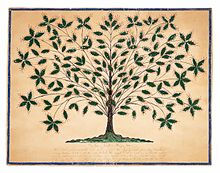
“Tree of Light” (1845 painting by Shaker artist Hannah Cohoon)
SimpliRural
by Jay Allen
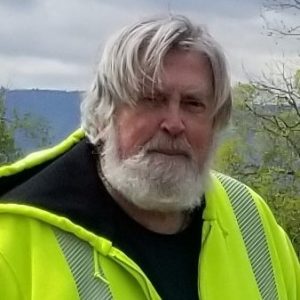
Today we are looking at Simplicity through the perspective of the Shakers and laughter.
The Shakers began in England as an offspring of the Quakers and were first known as “Shaking Quakers.” Their name came from the practice of dancing and shaking wildly when caught up in the Spirit of God. Shakers believed in Original Sin, and practiced devout celibacy, even for marital couples. They had their zenith in the USA in the mid-19th century, but inhibiting the expression of emotional/sexual intimacy led to a declining census. The only remaining active Shaker community is at the Sabbathday Lake Village in Maine.
Beliefs of Shakers include gender equality, communal ownership of property, living separately from society, pacifism, and living off the land as simply and naturally as possible. Shaker furniture was valued for craftsmanship and plain design. In 1848, Shaker Elder Joseph Brackett wrote the now universally popular song “Simple Gifts.”
I wonder what a modern Shaker society would look like if spiritual, emotional, and sexual intimacy could have been integrated with one another. For more details, please refer to the book The Story of the Shakers, by Flo Morse and the website www.learnreligions.com/the-shakers-4693219. An interesting 2019 interview with Bother Arnold Hadd of the Sabbathday Lake Shaker Village (the only active community today) can be found here.
The Simple Act of Laughter Can Enhance the Quality of Life
According to a Mayo Clinic study, the physical act of laughing causes more air intake, invigorating your heart, lungs, and circulatory system, leading to muscle relaxation and the elevation of endorphins and dopamine. This is all due to laughter, not humor! (The “H” word is a worthy topic for another time.) Does laughter require any practice or skill? Nooo! You can/should laugh for no reason! If you laugh in public, do so without any eye contact, as people may think you are laughing at them! More about the important benefits of laughter may be found in the article “8 Ways to Laugh More” in Experience Life magazine, May 2020.
Until next time, don’t worry about your laugh intake at Thanksgiving!
—Jay Allen

Progenitor of the Modern Environmental Movement
By Will Daniels
Is there another historical figure whose fame has diminished quite as much as Alexander von Humboldt’s? The 19th Century Prussian scientist, naturalist, humanitarian, and prolific writer was once second in recognition only to Napoleon, according to author Andrea Wulf in her 2015 biography The Invention of Nature: Alexander Von Humboldt’s New World. Von Humboldt epitomized the ideal—less possible in an age of specialization—of the unity of knowledge and the identity of the scientific and the esthetic.
Wulf’s book, one of the New York Times “Ten Best” of 2015, restores some of von Humboldt’s prominence. Another high-profile treatment of the great man is an exhibit at the Smithsonian American Art Museum, titled “Alexander von Humboldt and the United States: Art, Nature, and Culture.” The exhibit title and the sponsorship by the art museum, not Natural History, indicates the reach of his influence across 19th-century society. Although he spent only six weeks in the U.S. in 1804, his impact was deep, especially with President Thomas Jefferson.
Although the Smithsonian museums are now closed due to COVID-19, an excellent 35-minute preview of the exhibit by chief curator Eleanor Jones Harvey and other resources are available online here.
“Green Machine” Updates
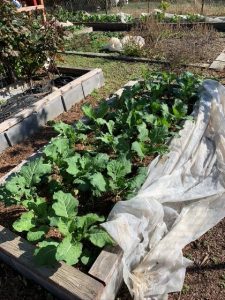
Rappahannock County
* The lovely fenced Amissville garden donated to ESJ by a friend for the benefit of the Rappahannock Food Pantry is producing beautiful fall crops. Two deliveries of fresh greens to the Pantry have included leaf lettuce, spinach, chard, and collards, and are much enjoyed by local families. A neighbor near the garden has been assisting with tending the beds of plants.
We also donated two large boxes of children’s books. Pantry volunteers are sorting them by age and distributing them to the families with children. It’s wonderful for children to own several books just for themselves, when the needs for even basic necessities in their families during this pandemic year are so great.
* Road Cleanup: On Monday, November 9, members of the ESJ Committee met at my home in Washington, Virginia, to do our autumn roadside trash pickup on the 2.3 mile length of Tiger Valley Road. This is the third time we have gathered to do this. It was a gorgeous day! We hope soon VDOT will erect a permanent sign indicating that Tiger Valley Road has been adopted by UUs of the Blue Ridge and Friends, because some neighbors who live on the road are interested in helping us.
— Ellie Clark
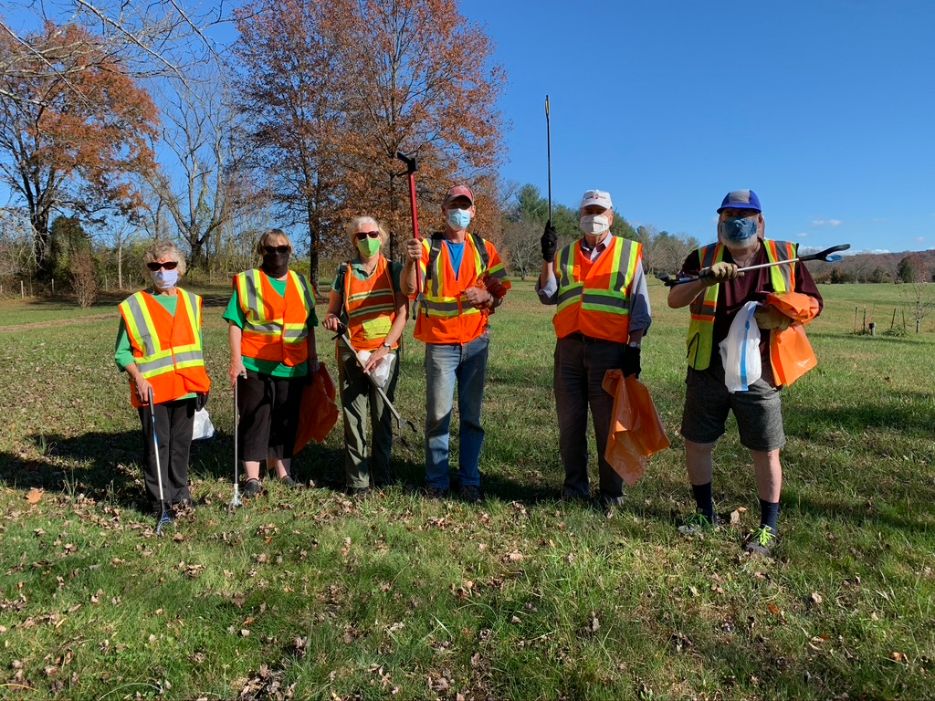
Left to right: Marilyn Zimmann, Carolyn McDowell, Sue and Will Daniels, Rev. Russ Savage, and Jay Allen
(Photo by Ellie Clark)
The Community Garden in Page County, sponsored by Valley Health, the Page Alliance for Community Action (PACA), and the Town of Stanley, Virginia, has been winterized. Several hundred pounds of produce (far surpassing the goal of 200 pounds) were harvested for the Page One food pantry, Page County Schools, and local residents. UUBridge members Will Daniels, Lisa McQuail, and Bridget Harrison were among the volunteers working on this project.
— Sue Daniels
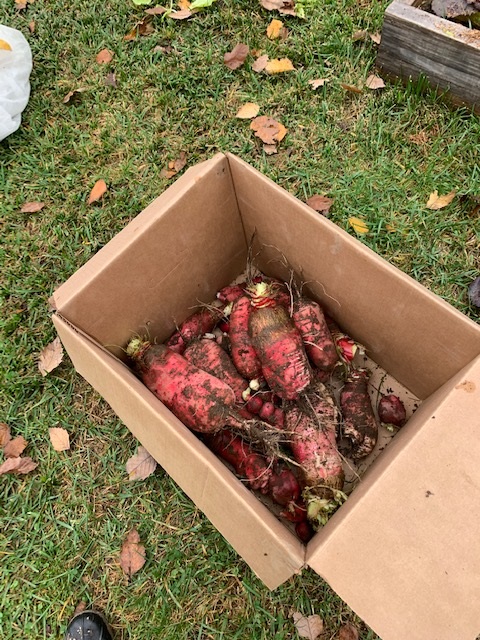
Giant radishes from Stanley Community Garden (Photo by Megan Gordon, PACA)
To our readers: we invite you to use the comments section below not only to give your thoughts on what you read here, but to recommend things to read, watch, or listen to related to environment and social justice. Also of interest are your own activities or accomplishments in the environment/social justice realm.
Recent Comments